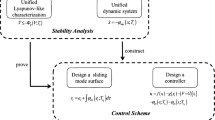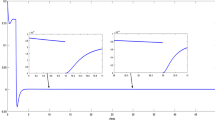Abstract
In the paper, we endeavor to study the asynchronous and resilient dissipative filtering issue for T–S fuzzy Markov jump singularly perturbed systems (MJSPSs) involving the dynamic event-triggered transmission protocol, partly known conditional probabilities, and deception attacks. A novel dynamic event-triggered transmission protocol is firstly offered to further decrease the data transmission percentage over the communication channels. To better depict the practical communication situations, the mutually independent random variables that subject to the Bernoulli distribution are adopted to formulate the occurrence of deception attacks. And an asynchronous and resilient filter is properly constructed, which yields that the filtering error systems are converted into the T–S fuzzy MJSPSs with time-varying delays. Then, the criteria of stochastically stable for the filtering error systems are presented concerning a group of linear matrix inequalities (LMIs). By solving the LMIs, the nonsynchronous and resilient dissipative filter, the weighting matrix of dynamic event-triggered transmission protocol can be concurrently determined. Eventually, an example is provided to verify the validity of the developed theoretical results. Further, for the prescribed dissipative performance, state trajectoires, filter trajectories, and filter errors are presented for MJSPSs involving deception attacks under different transmission protocols, which illustrate that both of them almost have the same decay rates. However, for the prescribed dissipative performance, the transmission rates are so different for two transmission protocols that the dynamic event-triggered transmission protocol is much lower than that of the static one.








Similar content being viewed by others
References
Kokotovic, P.V., Khalil, H.K.: Singular Perturbations in Systems and Control. IEEE Press, Piscataway (1986)
Xu, S.Y., Feng, G.: New results on \(H_{\infty }\) control of discrete singularly perturbed systems. Automatica 45(10), 2339–2343 (2009)
Shen, H., Li, F., Xu, S.Y., Sreeram, V.: Slow state variables feedback stabilization for semi-Markov jump systems with singular perturbations. IEEE Trans. Autom. Control. 63(8), 2709–2714 (2018)
Shen, H., Men, Y., Wu, Z.G., Park, J.H.: Nonfragile \(H_{\infty }\) control for fuzzy Markovian jump systems under fast sampling singular perturbation. IEEE Trans. Cybernet. 48(12), 2058–2069 (2018)
Wang, Y., Ahn, C.K., Yan, H., Xie, S.: Fuzzy control and filtering for nonlinear singularly perturbed Markov jump systems. IEEE Trans. Cybernet. 51(1), 297–308 (2020)
Wang, J., Huang, Z., Wu, Z., Cao, J., Shen, H.: Extended dissipative control for singularly perturbed PDT switched systems and its application. IEEE Trans. Circuits Syst. Regul. Pap. 67(12), 5281–5289 (2020)
Wang, Y.Q., Chen, F., Zhuang, G.M., Song, G.F.: Event-based asynchronous and resilient filtering for Markov jump singularly perturbed systems against deception attacks. ISA Trans. 112, 56–73 (2021)
Liu, X., Xia, J., Wang, J., Shen, H.: Interval type-2 fuzzy passive filtering for nonlinear singularly perturbed PDT-switched systems and its application. J. Syst. Sci. Complex. 14, 1–24 (2020)
Shen, H., Yang, C., Xia, J., Park, J. H.: Non-fragile fuzzy control for nonlinear fast sampling singularly perturbed systems subject to Markov jumping parameters. IEEE Trans. Fuzzy Syst. https://doi.org/10.1109/TFUZZ.2020.2990108
Wang, J., Xia, J., Shen, H., Xing, M., Park, J. H.: \(H_{\infty }\) synchronization for fuzzy Markov jump chaotic systems with piecewise-constant transition probabilities subject to PDT switching rule. IEEE Trans. Fuzzy Syst. https://doi.org/10.1109/TFUZZ.2020.3012761.
Ma, Q., Xu, S.Y.: Consensus switching of second-order multiagent systems with time delay. IEEE Trans Cybernet. (2020). https://doi.org/10.1109/TCYB.2020.3011448
Zhuang, G.M., Xia, J.W., Feng, J.E., Zhang, B.Y., Lu, J.W., Wang, Z.: Admissibility analysis and stabilization for neutral descriptor hybrid systems with time-varying delays. Nonlinear Anal. Hybrid Syst. 33, 311–321 (2019)
Shen, H., Men, Y.Z., Wu, Z.G., Cao, J.D., Lu, G.P.: Network-based quantized control for fuzzy singularly perturbed semi-Markov jump systems and its application. IEEE Trans. Circuits Syst. Regul. Pap. 66(3), 1130–1140 (2019)
Zhuang, G.M., Xu, S.Y., Xia, J.W., Ma, Q., Zhang, Z.Q.: Non-fragile delay feedback control for neutral stochastic Markovian jump systems with time-varying delays. Appl. Math. Comput. 355, 21–32 (2019)
Shen, H., Li, F., Wu, Z.G., Park, J.H., Victor, S.: Fuzzy-model-based non-fragile control for nonlinear singularly perturbed systems with semi-Markov jump parameters. IEEE Trans. Fuzzy Syst. 26(6), 3428–3439 (2018)
Wang, J., Liang, K., Huang, X., Wang, Z., Shen, H.: Dissipative fault-tolerant control for nonlinear singular perturbed systems with Markov jumping parameters based on slow state feedback. Appl. Math. Comput. 328, 247–262 (2018)
Wang, Y.Q., Chen, F., Zhuang, G.M., Yang, G.: Dynamic event-based mixed \(H_{\infty }\) and dissipative asynchronous control for Markov jump singularly perturbed systems. Appl. Math. Comput. 386, 125443 (2020)
Li, H., Wang, Y., Yao, D., Lu, R.Q.: A sliding mode approach to stabilization of nonlinear Markovian jump singularly perturbed systems. Automatica 97, 404–413 (2018)
Yue, D., Tian, E.G., Han, Q.L.: A delay system method for designing event-triggered controllers of networked control systems. IEEE Trans. Autom. Control. 58(2), 475–481 (2013)
Aminian, B., Araújo, J., Johansson, M., Johansson, K. H.: A virtual testbed for wireless cyber-physical systems. In: 39th Annual conference of the IEEE industrial electronics society 2013, pp 5588–5593
Girard, A.: Dynamic triggering mechanisms for event-triggered control. IEEE Trans. Autom. Control. 60(7), 1992–1997 (2015)
Luo, S., Deng, F.Q., Chen, W.H.: Dynamic event-triggered control for linear stochastic systems with sporadic measurements and communication delays. Automatica 107, 86–94 (2019)
Li, F.Z., Liu, Y.G.: Adaptive event-triggered output-feedback controller for uncertain nonlinear systems. Automatica 117, 109006 (2020)
Xie, Y., Ma, Q.: Adaptive event-triggered neural network control for switching nonlinear systems with time delays, IEEE Trans Neur Net Lear, https://doi.org/10.1109/TNNLS.2021.3100533.
Wang, Y.Q., Chen, F., Zhuang, G.M.: Dynamic event-based reliable dissipative asynchronous control for stochastic Markov jump systems with general transition probabilities. Nonlinear Dyn. 101, 465–485 (2020)
Liu, Y., Xia, J., Meng, B., Song, X., Shen, H.: Extended dissipative synchronization for semi-Markov jump complex dynamic networks via memory sampled-data control scheme. J. Franklin Inst. 357(15), 10900–10920 (2020)
Wang, Y.Q., Song, G.F., Zhao, J.J., Sun, J., Zhuang, G.M.: Reliable mixed \(H_{\infty }\) and passive control for networked control systems under adaptive event-triggered scheme with actuator faults and randomly occurring nonlinear perturbations. ISA Trans. 89, 45–57 (2019)
Wang, Y.Q., Zhuang, G.M., Chen, F.: A dynamic event-triggered \(H_{\infty }\) control for singular Markov jump systems with redundant channels. Int. J. Syst. Sci. 51(1), 158–179 (2020)
Liu, D., Yang, G.H.: Dynamic event-triggered control for linear time-invariant systems with gain performance. Int. J. Robust Nonlinear Control. 29(2), 507–518 (2019)
Wang, Y.Q., Zhuang, G.M., Chen, F.: Event-based asynchronous dissipative filtering for T–S fuzzy singular Markovian jump systems with redundant channels. Nonlinear Anal. Hybrid Syst. 34, 264–283 (2019)
Wang, Y., Hu, X., Shi, K., Song, X., Shen, H.: Network-based passive estimation for switched complex dynamical networks under persistent dwell-time with limited signals. J. Franklin Inst. 357(15), 10921–10936 (2020)
Wang, H.T., Wang, Y.Q., Zhuang, G.M., Lu, J.W.: Asynchronous passive dynamic event-triggered controller design for singular Markov jump systems with general transition rates under stochastic cyber-attacks. IET Control Theory Appl. 14(16), 2291–2302 (2020)
Wang, Y.Q., Zhuang, G.M., Chen, X., Wang, Z., Chen, F.: Dynamic event-based finite-time mixed \(H_{\infty }\) and passive asynchronous filtering for T-S fuzzy singular Markov jump systems with general transition rates. Nonlinear Anal. Hybrid Syst. 36, 100874 (2020)
Lee, E.A.: Cyber physical systems: design challenges. In: 11th IEEE International symposium on object and component-oriented real-time distributed computing (ISORC). IEEE. 2008, pp 363–369 (2008)
Ren, X.X., Yang, G.H.: Adaptive control for nonlinear cyber-physical systems under false data injection attacks through sensor networks. Int. J. Robust Nonlinear Control 30(1), 65–79 (2020)
Murguia, C., Shames, I., Ruths, J., Nešić, D.: Security metrics and synthesis of secure control systems. Automatica 115, 108757 (2020). https://doi.org/10.1016/j.automatica.2019.108757
Ding, D., Wei, G., Zhang, S., Liu, Y., Alsaadi, F.E.: On scheduling of deception attacks for discrete-time networked systems equipped with attack detectors. Neurocomputing 219, 99–106 (2017)
Wang, R.H., Hou, L.L., Zong, G.D., Fei, S.M., Yang, D.: Stability and stabilization of continuous-time switched systems: a multiple discontinuous convex Lyapunov function approach. Int. J. Robust Nonlinear Control 29(5), 1499–1514 (2019)
Ma, Q., Xu, S.Y.: Exact delay bounds of second-order multi-agent systems with input and communication delays: from algebra and geometric prospective. IEEE transactions on circuits and systems II: express briefs (2020). https://doi.org/10.1109/TCSII.2021.3094185
Zhang, Q., Liu, K., Xia, Y., Ma, A.: Optimal stealthy deception attack against cyber-physical systems. IEEE Trans Cybernet. (2019). https://doi.org/10.1109/TCYB.2019.2912622
Tian, E.G., Peng, C.: Memory-based event-triggering \(H_\infty \) load frequency control for power systems under deception attacks. IEEE Trans Cybernet. (2020). https://doi.org/10.1109/TCYB.2020.2972384
Li, Y.G., Yang, G.H.: Optimal deception attacks against remote state estimation in cyber-physical systems. J. Franklin Inst. 357(3), 1832–1852 (2020)
Peng, C., Li, J.C., Fei, M.R.: Resilient event-triggering \(H_{\infty }\) load frequency control for multi-area power systems with energy-limited DoS attacks. IEEE Trans. Power Syst. 32(5), 4110–4118 (2017)
Hu, S.L., Yue, D., Xie, X., Chen, X., Yin, X.: Resilient event-triggered controller synthesis of networked control systems under periodic DoS jamming attacks. IEEE Trans Cybernet. 49(12), 4271–4281 (2018)
Wang, J.H., Zhou, Y.G., Yang, Y.X.: 3-D measurement method for nonuniform reflective objects. IEEE Trans. Instrum. Meas. 69(11), 9132–9143 (2020)
Hu, S.L., Yue, D., Chen, X., Cheng, Z., Xie, X.: Resilient \(H_{\infty }\) filtering for event-triggered networked systems under nonperiodic DoS jamming attacks. IEEE Trans. Syst. Man Cybernet. (2019). https://doi.org/10.1109/TSMC.2019.2896249
Yan, Y., Yang, C., Ma, X., Zhou, L.: Sampled-data \(H_{\infty }\) filtering for Markovian jump singularly perturbed systems with time-varying delay and missing measurements. Int. J. Syst. Sci. 49(3), 464–478 (2018)
Acknowledgements
The paper was partly supported by the National Natural Science Foundation of China under Grant 61773191, 61803241, 61973170, and 61973168; Support Plan for Outstanding Youth Innovation Team in Shandong Higher Education Institutions under Grant 2019KJI010; Talent Introduction and Cultivation Plan for Outstanding Youth Innovation Team in Shandong Higher Education Institutions; the Fundamental Research Funds for the Central Universities (No. 2020ACOCP02).
Author information
Authors and Affiliations
Corresponding author
Rights and permissions
About this article
Cite this article
Zhang, S., Wang, Y., Zhuang, G. et al. Dynamic Event-Based Asynchronous and Resilient Dissipative Filtering for T–S Fuzzy Markov Jump Singularly Perturbed Systems Against Deception Attacks. Int. J. Fuzzy Syst. 24, 1491–1514 (2022). https://doi.org/10.1007/s40815-021-01204-9
Received:
Revised:
Accepted:
Published:
Issue Date:
DOI: https://doi.org/10.1007/s40815-021-01204-9




